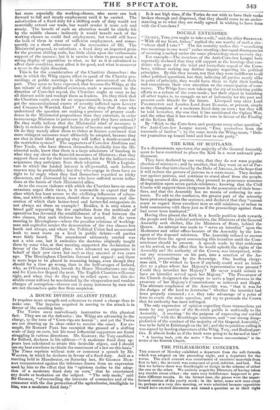THE KIRK OF SCOTLAND.
To a dispassionate spectator, the majority of the General Assembly seem to have contrived to place the Kirk in a most awkward pre- dicament.
They have declared by one vote, that they do not want popular election of ministers ; and by another, that they want an act of Par- liament like that introduced by the Duke of ARGYLL, in the hope that it will reduce the powers of patrons to a mere name. They declare war against patrons, and continue to stand aloof from the people. Having assumed this position, they proceed to pronounce sentence of deposition upon seven parish-ministers ; knowing that the Civil Courts will support these clergymen in the possession of their bene- fices, and that the Assembly has no means of enforcing its sen- tence. To add to the confusion, the greater part of the minority have protested against the sentence, and declared that they "cannot cease to regard these excellent men as still ministers, or refuse to hold communion with them just as if the proceedings against them had never been instituted."
Having thus placed the Kirk in a hostile position both towards the people and the judicial authorities, the Ministers of the General Assembly seek shelter, like the Ministers of State, behind the Queen. An attempt was made to " serve an interdict" upon the Moderator and other office-bearers of the Assembly by the law- agent of the deposed ministers. The Assembly refused to answer the letter from the agent announcing this intention until the Com- missioner should be present. A speech made by that nobleman on his arrival, to the effect that he would uphold the rights of the Assembly and the authority of the Crown, was interpreted, with- out any remonstrance on his part, into a sanction of the As- sembly's proceedings by the Sovereign. One leading clergy- man said, " He wished to know if anybody could send an inter- dict to a place where her Majesty's representative was present ? Could they interdict her Majesty ? He never would submit to have an interdict served upon her Majesty." The Procurator of the Church designated the attempt to serve a legal process in the presence of her Majesty's Commissioner as indecent and illegal. The ultimate conclusion of the Assembly was, " that it was for the Judges of the land to determine" whether the interdict had been properly executed ; i. e. they take advantage of a point of form to evade the main question, and try to persuade the Crown that its authority has been infringed.
The only expression of opinion regarding these transactions yet made by any portion of the Scottish public is unfriendly to the Assembly. A meeting "for the purpose of expressing our cordial sympathy" with the Strathbogie ministers, and " our strong disap- probation of the conduct of the majority of the General Assembly," was to be held in Edinburgh on the 2d ; and the requisition calling it was signed by leading characters of the Whig, Tory, and Radical par- ties. It almost looks as if the bush were going to be burned at last.*
• A burning bush, with the motto " Nec tamers consumebatur," is the device of the Scottish Church.


























 Previous page
Previous page